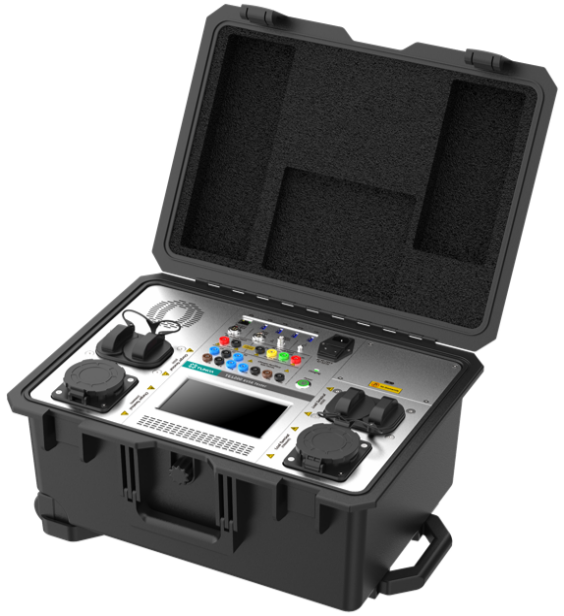Our Advantage: EV Chargers Tester
The Benefit of Adjustable Resistance Load
Tunkia EV Chargers Tester have two components in place, the portable tester and the adjustable resistance load. Tunkia EV Charger Tester solution chosen to use an adjustable resistance load instead of using an EV car as a load mainly due to 3 major considerations:
1. Adjustable resistance load is capable to support different EV Charger Capability & Compatibility
a. Different EV chargers have different charging capability, TUNKIA adjustable loads can set different ranges of testing points that can get a complete metrology characteristic testing.
b. EV Charger charging capability varies between each charger, there are charger with high power rating and low power rating. By using an adjustable resistance load, Tunkia solution are capable to handle almost all EV Charger in the market. Tunkia adjustable resistance load have DC loads, AC loads, and AC+DC Load combined, depending on the customer preference. For TUNKIA AC resistance load, both single phase and three phase are available. Whereas TUNKIA DC resistance load is supporting cascading capability with a maximum 180kw rating.
c. There is protocol between EV Charger and EV Car. EV car may only recognize the limited model of chargers, there is a tendency of failing to connect. Thus, by using Tunkia adjustable resistance load, we may omit these challenges.
2. Adjustable resistance load is capable to solving the problem of EV Battery fully Charged condition.
a. Imagining using an EV car to serve as a resistance load, when the EV Car is in a fully charged condition, the calibration testing needed to be stop. As the EV Car is no longer be able to serve as a resistance load any more.
3. Adjustable resistance load is able to supporting multiple EV Charging Standards
a. There are multiple connecting heads are available currently in the market, like CCS2, ChadeMO, IEC Type 1, IEC Type 2, GB/T, etc. Thus, if an EV Car serve as a resistance load for the calibration of an EV Charger, multiple type of EVs shall be prepared for this application. Instead, if it been replaced with an adjustable resistance load, we can utilize the adapter to cater to this application.


The Support of Temperature Measurement.
During our metrology characteristic test process, temperature measurement is essential. The specification of the EV Charger varies between different surrounding temperature. This has been in line with the China Metrology Verification Standard (JJG1149-2018). The specification tolerance of the EV charger needed to be compensated at different temperature point. TUNKIA Portable EV Tester have embedded the temperature and humidity measurement function in the unit. With these built in features, the temperature and humidity measurement can be sync automatically. This feature can reduce the number of equipment bring on to the site for the calibration purposes.
The Support of GPS Clock Calibration
Different country has different payment scheme for the usage of electricity. Some country would like to encourage people to use more electricity at night thus, the charges at night time may be cheaper. With this condition in place, the time clock present in the EV Charger is playing an important role. As the charges of electricity are different base on different time zone thus, the EV Charger clock has to be calibrated. With such challenges in place, Tunkia portable EV testers have embedded the GPS clock function as standard. With this GPS Clock in place, it would enable the calibration of the time clock. With this, we can ensure the EV Charger time clock are always showing the correct time.
The Support of Tester Traceability
The Tunkia EV testers been pack with all function that use as the master calibrator to calibrate the EV Charger. Meanwhile this Tunkia EV Tester is required to be regularly calibrated against higher standard in order to maintain the traceability. Thus, Tunkia EV Tester have allocate a dedicated calibration interfaces and a calibration adapter on the tester for our client to make it traceable to the higher standard.


The Support of Safety Inspection
There is a safety test feature available in the TUNKIA EV tester. One of the safety requirements of the EV Charger is that the charger should stop within a certain time frame when the stop button is hit. By using a manual method, as stop watch is being used to test this feature, however it would not be as accurate. With additional termination time testing capability on the TUNKIA EV Tester, user can have accurately captured the termination time automatically, without using additional tool and without any human error in place.
The Support of Monitoring of Real Time Waveform
TUNKIA EV tester unit does support the real time waveform acquisition measurement. Meanwhile TUNKIA EV tester present of the extra auxiliary connection nearby the charging port. If customer would like to troubleshoot any connection error and externally monitoring the waveform of the 3-phase connection, customer can utilize the Auxiliary test point to transfer the AC charging socket to a conventional instrument.
The Automatic Reporting of Testing Results
TUNKIA EV Tester automatic reporting features is available, the file format is word file, where it provides flexibility to our client to made some amendment based on their own requirement. This feature is customizable according to client requirement.
The Support of Remote Control
Remote control the TUNKIA EV Tester with a PC is available, considering the calibration work on the EV Charger under the hot environment, TUNKIA EV Tester can be control remotely.


































